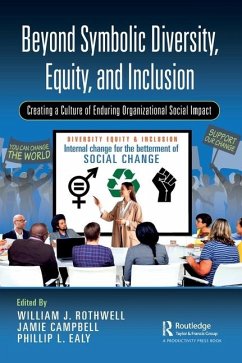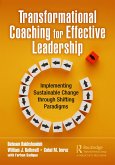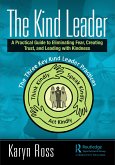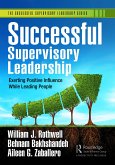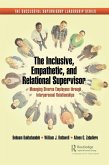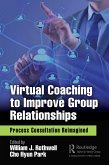Beyond Symbolic Diversity, Equity, and Inclusion
Creating a Culture of Enduring Organizational Social Impact
Herausgeber: Rothwell, William J; Ealy, Phillip L; Campbell, Jamie
Beyond Symbolic Diversity, Equity, and Inclusion
Creating a Culture of Enduring Organizational Social Impact
Herausgeber: Rothwell, William J; Ealy, Phillip L; Campbell, Jamie
- Gebundenes Buch
- Merkliste
- Auf die Merkliste
- Bewerten Bewerten
- Teilen
- Produkt teilen
- Produkterinnerung
- Produkterinnerung
This book extends strategic diversity work beyond internal organization efforts toward social engagement and accountability and supports organizations to ground social impact across both business and employee interests, the first of which is ethics, covered in the initial chapter.
Andere Kunden interessierten sich auch für
![Transformational Coaching for Effective Leadership Transformational Coaching for Effective Leadership]() Behnam BakhshandehTransformational Coaching for Effective Leadership174,99 €
Behnam BakhshandehTransformational Coaching for Effective Leadership174,99 €![High-Performance Coaching for Managers High-Performance Coaching for Managers]() William J RothwellHigh-Performance Coaching for Managers153,99 €
William J RothwellHigh-Performance Coaching for Managers153,99 €![The Role of HR in the Transforming Workplace The Role of HR in the Transforming Workplace]() The Role of HR in the Transforming Workplace174,99 €
The Role of HR in the Transforming Workplace174,99 €![The Kind Leader The Kind Leader]() Karyn RossThe Kind Leader126,99 €
Karyn RossThe Kind Leader126,99 €![Successful Supervisory Leadership Successful Supervisory Leadership]() William J RothwellSuccessful Supervisory Leadership142,99 €
William J RothwellSuccessful Supervisory Leadership142,99 €![The Inclusive, Empathetic, and Relational Supervisor The Inclusive, Empathetic, and Relational Supervisor]() Behnam BakhshandehThe Inclusive, Empathetic, and Relational Supervisor144,99 €
Behnam BakhshandehThe Inclusive, Empathetic, and Relational Supervisor144,99 €![Virtual Coaching to Improve Group Relationships Virtual Coaching to Improve Group Relationships]() Virtual Coaching to Improve Group Relationships154,99 €
Virtual Coaching to Improve Group Relationships154,99 €-
-
-
This book extends strategic diversity work beyond internal organization efforts toward social engagement and accountability and supports organizations to ground social impact across both business and employee interests, the first of which is ethics, covered in the initial chapter.
Hinweis: Dieser Artikel kann nur an eine deutsche Lieferadresse ausgeliefert werden.
Hinweis: Dieser Artikel kann nur an eine deutsche Lieferadresse ausgeliefert werden.
Produktdetails
- Produktdetails
- Verlag: Taylor & Francis
- Seitenzahl: 236
- Erscheinungstermin: 28. Juni 2024
- Englisch
- Abmessung: 254mm x 178mm x 18mm
- Gewicht: 699g
- ISBN-13: 9781032575094
- ISBN-10: 1032575093
- Artikelnr.: 70370427
- Herstellerkennzeichnung
- Libri GmbH
- Europaallee 1
- 36244 Bad Hersfeld
- gpsr@libri.de
- Verlag: Taylor & Francis
- Seitenzahl: 236
- Erscheinungstermin: 28. Juni 2024
- Englisch
- Abmessung: 254mm x 178mm x 18mm
- Gewicht: 699g
- ISBN-13: 9781032575094
- ISBN-10: 1032575093
- Artikelnr.: 70370427
- Herstellerkennzeichnung
- Libri GmbH
- Europaallee 1
- 36244 Bad Hersfeld
- gpsr@libri.de
William J. Rothwell, Ph.D., DBA, SPHR, SHRM-SCP, RODC, CPTD Fellow is President of Rothwell & Associates, Inc. and Rothwell & Associates, LLC (see www.rothwellandassociates.com). He is also a Distinguished Professor in the Workforce Education and Development program, Department of Learning and Performance Systems, at The Pennsylvania State University, University Park campus. He has authored, co-authored, edited, or co-edited three hundred books, book chapters, and articles-including 154 books. Before arriving at Penn State in 1993, he had 20 years of work experience as a Training Director and HR professional in government and business. He has also worked as a consultant for over 50 multinational corporations--including Motorola China, General Motors, Ford, and others. In 2012 he earned ASTD's prestigious Distinguished Contribution to Workplace Learning and Performance Award; in 2013 ASTD honored him by naming him as a Certified Professional in Learning and Performance (CPLP) Fellow; in 2022 he was honored by Penn State University with the Global Lifetime Achievement Award (the University's highest award for doing international work) and was honored by the Organization Development Network by receiving the Lifetime Achievement Award. Among Dr. Rothwell's most recent books are (Routledge, 2022), High-performance Coaching for Managers (Routledge, 2022), Rethinking Diversity, Equity and Inclusion: A Step-by-Step Guide to Facilitating Change (Routledge, 2022), Organization Development Interventions: Executing Effective Organizational Change(Routledge, 2021), Virtual Coaching to Improve Group Relationships: Process Consultation Reimagined (Routledge, 2021), Innovation Leadership (Routledge, 2018), Improving Human Performance, 3rd ed. (Routledge, 2018), Evaluating Organization Development: How to Ensure and Sustain the Successful Transformation (CRC Press, 2017), Marketing Organization Development Consulting: A How-To Guide for OD Consultants (CRC Press, 2017), and Assessment and Diagnosis for Organization Development: Powerful Tools and Perspectives for the OD Practitioner (CRC Press, 2017), Phillip L. Ealy, M.P.S. is a retired United States Army Officer who advocated for women going into restricted combat arms roles. Phillip also developed US and foreign militaries, building international coalitions. He works as the coaching coordinator for the Children, Youth, and Families at Risk (CYFAR) grant program. In this role, Phillip trains and develops coaches who work with land-grant universities on implementing government-funded programs for local communities. Phillip holds a Master of Professional Studies in Organization Development and Change and is completing a Ph.D. in Workforce Education and Development with an emphasis in Human Resource Development and Organization Development from Pennsylvania State University. He holds an undergraduate degree in Communications from West Virginia State University. Jamie Campbell, Ph.D., M.Ed. serves as the Assistant Dean for Diversity Enhancement Programs in the Smeal College of Business at The Pennsylvania State University. He has served as a panelist on topics ranging from social justice to student issues and has been a keynote speaker for various leadership programs. Jamie also serves as an advisor to student organizations within the Smeal College of Business and mentors graduates of the college working in Fortune 500 companies. He was an inaugural Fellow with the CEO for Racial Equity Fellowship which supports programs for underrepresented persons across the United States. Jamie is a 1995 graduate of Morehouse College where he obtained his B.A. in Sociology. He completed an M.Ed. in Adult Education and Instruction Education from Central Michigan University in 2003. Jamie is a Ph.D. graduate of the Workforce Education Program with concentrations in Organization Design and Human Resource Development at The Pennsylvania State University. His research focuses on Succession Planning as a form of Crisis Management.
Chapter 1: Step 1: Beyond Organizational DEI: A Model to Guide Social
Change
Chapter 2: Step 2: Assessing Your Organization's Social Change Profile
Chapter 3: Step 3: Examining the Social Context of the Organization
Chapter 4: Step 4: Engaging Employees as Agents of Social Change
Chapter 5: Step 5: Building an Impetus for Social Change
Chapter 6: Step 6: "Marketing" the Organization as a Social Change Agent
Chapter 7: Step 7: Facilitating the Development of an Organizational
Strategic Plan
Chapter 8: Step 8: Strategies for Implementing a Social Change Plan
Chapter 9: Step 9: Managing Opposition Inside and Outside the Organization
Chapter 10: Step 10: Showcasing Your Organization's Talent Beyond
Organizational Borders
Chapter 11: Step 11: Communicating Your Organization's Social Change
Efforts
Chapter 12: Step 12: Activating Your Plan and the Future of Social Change
Change
Chapter 2: Step 2: Assessing Your Organization's Social Change Profile
Chapter 3: Step 3: Examining the Social Context of the Organization
Chapter 4: Step 4: Engaging Employees as Agents of Social Change
Chapter 5: Step 5: Building an Impetus for Social Change
Chapter 6: Step 6: "Marketing" the Organization as a Social Change Agent
Chapter 7: Step 7: Facilitating the Development of an Organizational
Strategic Plan
Chapter 8: Step 8: Strategies for Implementing a Social Change Plan
Chapter 9: Step 9: Managing Opposition Inside and Outside the Organization
Chapter 10: Step 10: Showcasing Your Organization's Talent Beyond
Organizational Borders
Chapter 11: Step 11: Communicating Your Organization's Social Change
Efforts
Chapter 12: Step 12: Activating Your Plan and the Future of Social Change
Chapter 1: Step 1: Beyond Organizational DEI: A Model to Guide Social
Change
Chapter 2: Step 2: Assessing Your Organization's Social Change Profile
Chapter 3: Step 3: Examining the Social Context of the Organization
Chapter 4: Step 4: Engaging Employees as Agents of Social Change
Chapter 5: Step 5: Building an Impetus for Social Change
Chapter 6: Step 6: "Marketing" the Organization as a Social Change Agent
Chapter 7: Step 7: Facilitating the Development of an Organizational
Strategic Plan
Chapter 8: Step 8: Strategies for Implementing a Social Change Plan
Chapter 9: Step 9: Managing Opposition Inside and Outside the Organization
Chapter 10: Step 10: Showcasing Your Organization's Talent Beyond
Organizational Borders
Chapter 11: Step 11: Communicating Your Organization's Social Change
Efforts
Chapter 12: Step 12: Activating Your Plan and the Future of Social Change
Change
Chapter 2: Step 2: Assessing Your Organization's Social Change Profile
Chapter 3: Step 3: Examining the Social Context of the Organization
Chapter 4: Step 4: Engaging Employees as Agents of Social Change
Chapter 5: Step 5: Building an Impetus for Social Change
Chapter 6: Step 6: "Marketing" the Organization as a Social Change Agent
Chapter 7: Step 7: Facilitating the Development of an Organizational
Strategic Plan
Chapter 8: Step 8: Strategies for Implementing a Social Change Plan
Chapter 9: Step 9: Managing Opposition Inside and Outside the Organization
Chapter 10: Step 10: Showcasing Your Organization's Talent Beyond
Organizational Borders
Chapter 11: Step 11: Communicating Your Organization's Social Change
Efforts
Chapter 12: Step 12: Activating Your Plan and the Future of Social Change

